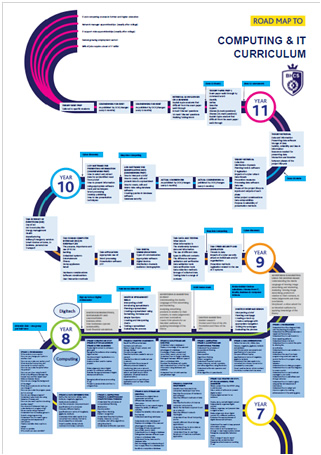Computing and IT
Our Vision
Our vision is that students learn the workings of the digital systems that pervade their world and are equipped with the language and understanding of information technology systems in the workplace. That they can keep up with the pace of technological change so that they can remain effective, well-informed and safe citizens.
Key Stage 3
At Key Stage 3 we provide our students with a breadth and balance of Digital Literacy, IT and Computer Science knowledge covering all 9 strands of the National Curriculum through their Computing lesson, timetabled once per week.
Within our curriculum, we aim to identify portable knowledge and skills which are revisited and built upon cumulatively across Key Stage 3 and ensure that they are fully embedded in students’ long-term memory.
Subject-specific vocabulary is a focus across all year groups where students create a glossary of the key terms which they use in contexts that are relevant to the unit of work they are studying. This gives students the opportunity to engage with more complex materials, develop their reading skills, practise effective research skills and explore current developments in the world of technology/computing.
News clips from the BBC news website Technology section is sometimes shown in order to engage students with current affairs and make the link between what they are learning in the classroom and the outside world.
When studying skills units, students complete a learning journal where they reflect on how they have solved problems, worked independently and kept to time limits.
Key Stage 4
For students who opt to study IT at Key Stage 4, we provide them with a breadth of subject knowledge that equips them not only with the requirements of OCR Level 2 IT but also empowers them with skills for use in the world of work such as a detailed understanding of the collection, processing, storage and presentation of data. The specification has recently changed and our current Y11 students will be the last cohort to study the previous specification.
Current Y11: IT students learnt all the theory units in Year 9 and coursework skills in 10 where students were given a project similar to that which they will be given for coursework, cross referencing them to prior learning at Key Stage 3. Coursework completion starts in June of Year 10 and is completed by October half term. The use of IT is studied in the context of project management and includes study of the project life cycle, project management tools (Gantt charts, PERT, visualisation diagrams and flowcharts to name a few, types of data, data collection methods, data storage, data legislation, threats to data, data security, validity of data, data manipulation, processing data, presenting data and communicating data). Students will use predominantly spreadsheet and database software but will also use desktop publishing, presentation, word processing and web authoring dependent on the requirements of the coursework. Once the coursework has been completed students will revise the theory topics and practice exam technique to prepare them for the final exam.
Current Y10 & Y9: The focus in Year 9 is theory and in Year 10 it’s software skills to prepare them for the two NEA projects, where students are given projects similar to those which they will be given for their NEAs. The 1st NEA is focussed on spreadsheets where they have to plan, create, test and evaluate a spreadsheet solution; the second NEA is focussed on the planning, designing, testing and planning an augmented reality product. In Year 10, at least one NEA is completed and the 2nd one started in the summer term. Once this is completed in the Autumn term, exam preparation takes place.
Enrichment Opportunities
Students can attend coding club after school and go on trips to local Further Education colleges to learn about courses in computing and IT. We also offer opportunities to meet professionals online about project management and vocations which require coding skills.
Assessment
Students who choose IT as a KS4 option study the OCR IT qualification which is a GCSE equivalent.
Current Y11: The final grade is split between a 20-hour coursework project and a written exam (each have an equal weighting of 50%).
Current Y10 & Y9: The grade is split between two NEA (each worth 30% of the final grade) and a final exam paper worth 40% of the final grade.
For all year groups, assessment is carried out with the use of past exam questions, so students know from the start of their Key Stage 4 studies what to expect.

